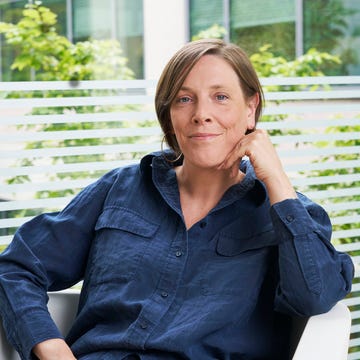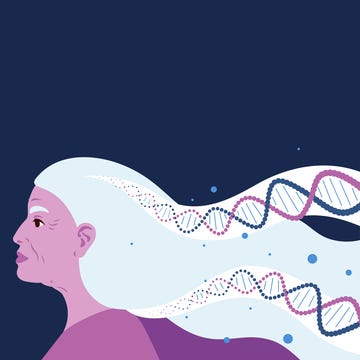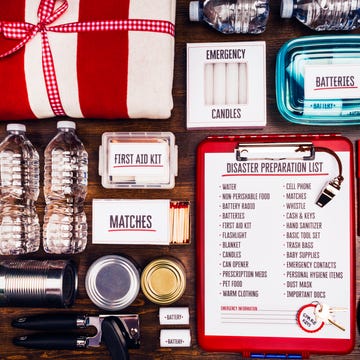Women of a certain age sometimes have their symptoms dismissed
My mum was officially diagnosed at 54, but looking back, she probably had symptoms for a good four or five years before then. When she first noticed odd things going on, she took herself to the doctor and explained that she wasn’t feeling herself. She was told that all her experiences were common symptoms of the menopause. It sounded like brain fog, so they said, ‘this is common among women your age’, and that was that.
At home, though, she deteriorated. She began doing things that were very odd. I remember being 14 and watching her make tea. She’d pour the boiling water into the canister containing the tea bags, instead of into the cup. We’d find things in the fridge that shouldn’t be there. It just wasn’t mum.
Eventually, my dad said we needed a second opinion. We moved doctors and they sent her for a scan. It was early onset dementia. Had she been diagnosed earlier, we’d at least have had time to prepare, so I’d really like there to be more awareness of – and more conversations about – early onset dementia, particularly among women.
As it was, only about 12 months after the diagnosis, life looked very different. By then, I was 17 and my sister was only 14. It was heartbreaking and so frightening to see your mum, someone who’s supposed to be looking after you, deteriorate so fast. Those roles were reversed so quickly.
The truth is not always the best policy
Mum would say, ‘I’m just going to go and find my dad,’ or ask when her parents were coming home, when they’d been dead 20 years. In the beginning, the temptation was to correct her, to try and help her hold on to the truth. But I learnt that it was easier and kinder to say, ‘Okay then, Mum,’ and she’d be happy, then forget five minutes later.
Letting go can be good for you, too
You get to a point where you think: I could say this over and over, but she’s not coming back. She’ll never be the person she was. So why am I stressing myself out and upsetting her? You have to come to terms with the fact that this is her now, so it’s best to go with the flow.
It’s not just memory loss
For us, that was such a small part of it. I could deal with the repetitive conversations. It was the other stuff I found hard. Seeing her deteriorate to a place where she couldn’t care for herself, even brush her teeth. And then she became quite verbally aggressive with my younger sister. Watching that was so painful.
You can lose your own life, as you’d imagined it, too
I was at the point of deciding whether or not to go to uni. Caring for mum had a big impact on my decision not to go. I couldn’t leave her. Meanwhile, my sister was doing her GCSEs, she was only a child. When she had her school prom, her friends picked dresses out with their mothers. She didn’t have that. She was caring for ours.
It’s physically exhausting, too
Mum would wake in the night, stroll up and down. We had baby gates at the top of the stairs because we were afraid she’d fall. Dad moved out a couple of years after mum’s diagnosis, so when I was 19 or 20, and my sister 16 or 17, the two of us would be getting up and guiding her back to bed. Then she’d be up again. It was exhausting, before the day had even started. I’d be up early to go to work, my sister would head off to college, so the carers would come in till my sister would get home and it all started again.
The admin is bewildering, but you learn
I suddenly had to handle all mum’s finances, her benefits, her pensions… In the early days, I just remember thinking: I haven’t got a clue what I’m doing. But you learn.
Community is key
It was hard for my teenage friends to relate to the experience of caring for someone, but even when I reached working age, I’d tell people I was caring for mum and they’d be astonished. It was really hard. Early onset dementia is still talked about so little.
The Alzheimer’s Society were really good, though. They put us in touch with a young carers group for my sister in the early days, and they got us involved in the annual memory walk. Being part of a big community, with people who are going through similar things, was really comforting, from day one.
Caring is hard, but letting go is harder still
Making the decision to move mum into a care home was one of the hardest things I’d ever had to do. Out of everything, that was the hardest bit.
Deterioration can be fast, but caring is slow
Mum was in the nursing home for 10 years before she passed away. Initially, she didn’t want to be there. She asked to come home. But she could still talk, walk and eat unaided. The most heartbreaking stage, in hindsight, was when she became completely bedridden. She didn’t open her eyes. She couldn’t feed herself. She had to be spoon fed. She just became this body in a bed. That lasted for three or four years. For me, those later years were a complete and utter shock. No one talks about them.
Medical notes only tell part of the story
Every time mum had to go into hospital, I had to be there to advocate for her. I couldn’t rely on her medical notes. They described her medical condition, but not who she was, or how she was – how she behaved typically, or communicated usually. Once, a doctor asked me: ‘What’s your mum’s norm?’ It was the only time anyone ever asked that and I thought: ‘What a great question’. Because only my sister and I could tell you how my mum communicated by squeezing my hand, for example. Without that information, so much is lost.
Adjusting to life after caring is not straightforward
Mum passed away in 2023, aged 65. I knew the time would come and I thought I’d feel a great sense of relief. But I’ve not felt that. All last year, I still had this feeling that I should be doing something. I should be going to the nursing home, looking after her finances. That feeling of responsibility is hard to shake off.
Remembering them how they were before is important
Now that she’s gone, I make a real effort to remember her how she was before the dementia. Your mind gets filled with the memories of caring for her, instead of the happy ones from when she was still ‘Mum’. I try to talk about her as she was, as much as possible. I tell my daughter things like, ‘this was grandma’s favourite song’. We watch home videos, or remember the game she played with us when we were small. I want to remember Mum as Mum.
If you’re worried about yourself, or someone close to you, then check your symptoms today using Alzheimer’s Society’s symptom checklist. Visit alzheimers.org.uk/checklist or call their Dementia Support Line on 0333 150 3456.













